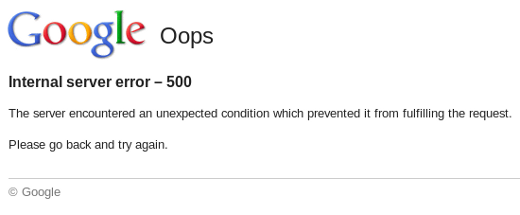I can't bring myself to write a headline that involves the words "Google+," "Facebook killer" and a leading question mark. But that's no doubt what they're hoping for with this announcement, isn't it?
Let's review the contenders up until now. MySpace, aka The One Before Facebook (depending on your age and perspective), is in the throes of a slow death scene. Diaspora, the open source hopeful, flopped. And even Google's own employees admit Buzz went badly.
If you read my Diaspora posts, you know I'm ever-optimistic. And Google+ has some promise. Unlike Buzz, it's not being foisted onto unwilling users. And one can hope that Buzz was also a lesson in privacy concerns for Google--and that the lesson stuck.
It also may be coming at just the right time. Facebook has recently seen significant drops in US and Canadian users. Some point to the fact that the site has essentially reached ubiquity, as much as it can--the only users left not signed up are the ones who aren't interested, can't access it, or refuse to use it. That means the only way to go is down. But what if it's actually reaching the place that so many sites before it have--simple disinterest and overuse as the shine wears off? Maybe some have finally gotten tired of worrying about privacy. This could be Google's prime point of opportunity.
Wired quotes Shimrit Ben-Yair, Google's social graph product manager, on the other potential opportunity. "On Facebook I overshare. On Twitter, I undershare. If Google hits that spot in the middle, we can revolutionize social interaction," he said.
But then comes the sticking point of social media, and one that Diaspora promised to solve: data portability. Specifically, of your friends list, which is the make-or-break for a social media platform. If you don't have any friends, you'll never log in.
On the positive side for Google, they already have a massive user base to tap into, which they tried to blitz with Buzz and will be approaching differently this time around. And that same user base also has large amounts of infomation already in Facebook. In that same Wired article linked above (which I highly recommend reading), Joseph Smarr of Google says that he went to Facebook last year to discuss whether they would allow users to export connections. Since then, the relationship between the companies hasn't been entirely friendly.
Connections were one of the biggest problems with the way Buzz approached social media. It assumed that if you had ever emailed someone from your Gmail account, that the two of you were friends. Google+ will have to fix that, and the ability to import your connections from Facebook--many of whom you've probably never emailed--would be a big start. Right now, there's no indication that that will be an option.
On top of that, the rollout is slow. That's definitely a lesson learned over the Buzz failure. But one day in, it's not going that well, at least from my perspective. Plus.google.com says that they've exceeded capacity, even for those with invitations. A friend's Facebook status (amusingly enough) says when he tried to log in, he was sent in circles, unable to actually log in. Then he discovered he got different results in Firefox and Chrome (neither successful). I lack an invite and clicked the "Keep Me Posted" button to find out when more invitations are available. I dutifully entered my email address (shouldn't it already know, since I'm logged in to Google while on this form?) and got this:

Pluses, perils, and pitfalls, Google's biggest advantage in this venture is simply being big. The company is invested in Google+. Really invested. They believe that finding success in social platforms will be important to their business going forward. Do you think Google+ will be that success?




10 Comments